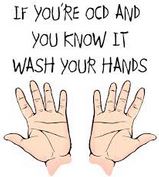
I have had an interest in treating OCD for more than 25 years and seen it take many forms. Common obsessions have included concerns about contamination from chemicals, sticky substances or germs; being infected with AIDS or herpes, accidentally harming or attacking loved ones or strangers, questioning one’s sexual orientation, being possessed, being a paedophile or rapist, flooding or burning the house down, being burgled, losing valuables, things being out of order or not “feeling right”.
These intrusive thoughts then lead to all sorts of rituals including excessive hand washing; checking appliances, belongings, taps, lights, locks, seeking reassurance about what just happened; ritualised excessive praying; repeating behaviours a certain number of times and retracing ones steps or movements (either physically or in one’s mind) or re-reading emails, assignments, text books and letters.
The lives of these tortured souls become more and more narrow as they start to avoid situations that could trigger their obsessions. It can get to the point where some sufferers become unable to leave their room or perform basic activities we take for granted. The obsessions can limit behaviours such as showering, shopping, reading or writing, catching up with friends, preparing food or eating out, driving or catching public transport, using public toilets and cleaning the house.
OCD tends to both wax and wane for the sufferer, becoming worse at times of increased stress. The tendency to obsess often arrives before the subject of its attention does. If you have a mind inclined to obsess, it tends to look for a place to land – and relationships are a rich place for it to find a landing ground.
“Relationship obsessive compulsive disorder” or ROCD is a relatively new phenomenon. It was first described as recently as 2012. However, it is receiving increasing attention by researchers and clinicians. When I started working in the OCD field, this condition was unheard of. However, recently, in one week, I had three clients who were referred for ROCD!
Essentially, ROCD is excessive ruminating about your feelings towards your partner or your partner’s feelings towards you, or the “rightness” of the relationship experience. ROCD, can cause you to spend hours analysing your feelings, or your partner’s flaws. It can lead to fears about your own inadequacies and whether you are about to be dumped or fears about future regrets. ROCD also leads to a great deal of reassurance seeking from your partner, friends and family or through internet searches.
The lives of these tortured souls become more and more narrow as they start to avoid situations that could trigger their obsessions. It can get to the point where some sufferers become unable to leave their room or perform basic activities we take for granted. The obsessions can limit behaviours such as showering, shopping, reading or writing, catching up with friends, preparing food or eating out, driving or catching public transport, using public toilets and cleaning the house.
OCD tends to both wax and wane for the sufferer, becoming worse at times of increased stress. The tendency to obsess often arrives before the subject of its attention does. If you have a mind inclined to obsess, it tends to look for a place to land – and relationships are a rich place for it to find a landing ground.
“Relationship obsessive compulsive disorder” or ROCD is a relatively new phenomenon. It was first described as recently as 2012. However, it is receiving increasing attention by researchers and clinicians. When I started working in the OCD field, this condition was unheard of. However, recently, in one week, I had three clients who were referred for ROCD!
Essentially, ROCD is excessive ruminating about your feelings towards your partner or your partner’s feelings towards you, or the “rightness” of the relationship experience. ROCD, can cause you to spend hours analysing your feelings, or your partner’s flaws. It can lead to fears about your own inadequacies and whether you are about to be dumped or fears about future regrets. ROCD also leads to a great deal of reassurance seeking from your partner, friends and family or through internet searches.

It's all about Doubt
It is doubt that gives ROCD oxygen. So why has ROCD arrived now? Is it because the current generation have witnessed so many parents separate that they worry about making the same mistake? They are acutely aware of the impact on the rest of their life and the lives of children they might have.
Combine this with easy access to the internet with a plethora of YouTube videos, quizzes and articles by relationship therapists and dating coaches. All offering advice to guide you in working out if you are with a “quality” partner or in a good relationship. While it is important to learn what we can about relationships and how to choose a healthy one, if you have a tendency to obsess, it may be better to see these experts in person than trawl the net and feed the doubt.
And then you have social media encouraging you to compare yourself and your partner with everyone else, promoting feelings of inadequacy and self-consciousness. And finally, we are now living in a world of internet dating and dating Apps where the options for choosing a partner have increased exponentially. Research has long demonstrated that the more choice you have, the harder it is to make a decision. This is known as the “paradox of choice” where more choice leads to less satisfaction. Again, it feeds us doubt.
All of these factors have created the perfect storm for those with the psychological and biological factors which predispose them to develop OCD, to have ROCD.
| Warning Signs There is no doubt (no pun intended) that choosing a life partner requires considered reflection. Doubts about your partner are normal during the dating phase, times of conflict and just before making a major commitment like moving in together, or marrying. So, what distinguishes these normal intrusions from ROCD? |
Some warning signs of ROCD include:
- Spending a lot of time (more than an hour a day) ruminating about it
- Trying to counter the doubts by suppressing them or having thoughts to counteract them
- Constantly monitoring your feelings about and sexual attraction for your partner (nothing will kill this more quickly!)
- Excessively comparing your partner with others, or past relationships or characters in movies and novels
- Avoiding situations and people that might trigger your doubts
- Avoiding physical or emotional intimacy with your partner for fear he/she may end up being hurt
- Excessive time spent doing things designed to relieve your doubts like seeking reassurance from others
- Repeatedly asking your partner to confirm their love for you
- Confessing your doubts to your partner
- The doubts are unwanted and distressing
- The doubts are interfering with other aspects of your life (like work, study, family, socialising)
- The intrusive thoughts conflict with your values (e.g. you would not normally be concerned about this “flaw” in a person)
- The intrusive thoughts conflict with a part of you that knows that you have a reasonably good relationship
- The worries may be in the form of images, thoughts and urges, rather than just a verbal thought
- Other OCD symptoms or a past history of OCD
- A history of similar ruminations in previous relationships
It can be very tricky if you have both ROCD and real concerns about your relationship. If this is the case, I suggest you postpone any decisions about ending the relationship until after you have had treatment for your ROCD, so your decision can be more reality based.
ROCD is treated with a combination of psychological strategies. These include learning about problematic beliefs which turn normal intrusions into obsessions; ways of challenging and managing intrusive thoughts; imaginal and real exposure to feared situations while stopping compulsive behaviours (like reassurance seeking) that maintain the ROCD. Training in mindfulness skills to make it easier to let the thoughts come and go without engaging with them can also be helpful.
For more comprehensive information about ROCD and treatment, I recommend this website which was developed by the leading researchers in this field and contains numerous resources including information about the App they developed to assist ROCD sufferers.
ROCD is treated with a combination of psychological strategies. These include learning about problematic beliefs which turn normal intrusions into obsessions; ways of challenging and managing intrusive thoughts; imaginal and real exposure to feared situations while stopping compulsive behaviours (like reassurance seeking) that maintain the ROCD. Training in mindfulness skills to make it easier to let the thoughts come and go without engaging with them can also be helpful.
For more comprehensive information about ROCD and treatment, I recommend this website which was developed by the leading researchers in this field and contains numerous resources including information about the App they developed to assist ROCD sufferers.



 RSS Feed
RSS Feed